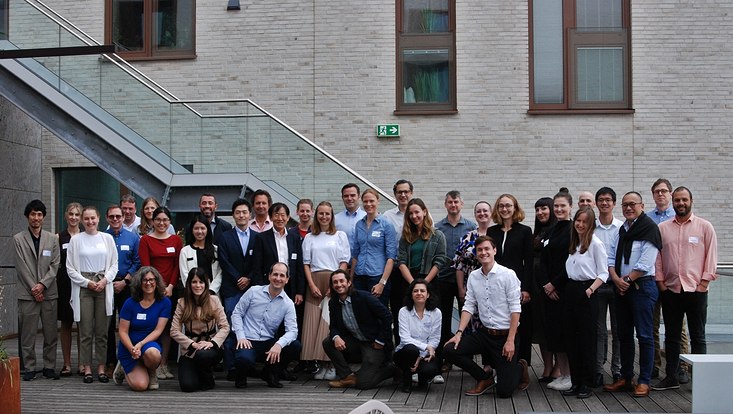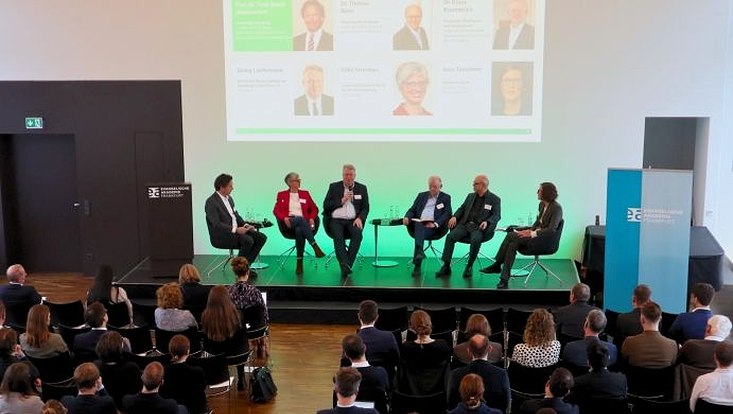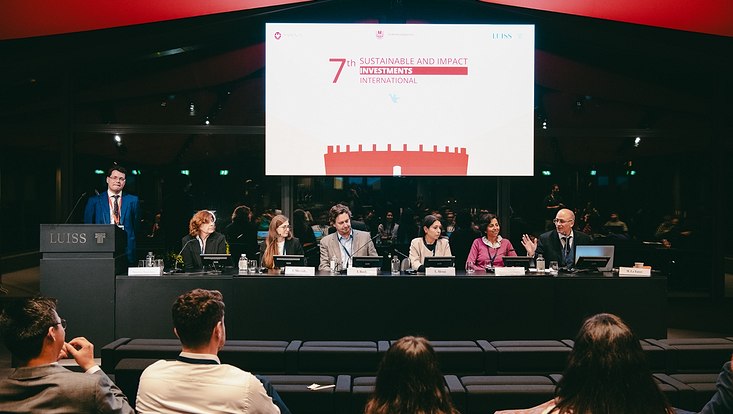insb. Energie- und Umweltmanagement
Researchers and industry representatives gather at second D°GREES Symposium in Hamburg to discuss "Climate Management Matters"
6. Juli 2023

Foto: Jakob Strobel
During the last week of June, the second D°GREES Symposium took place in Hamburg. As an integral part of our research on 20 companies from five different countries, the main goals of the Symposium were to bring together all parties involved in the D°GREES project and enhance collaboration among them. The D°GREES project team was able to invite representatives of most participating companies as well as our academic partners again for a three-day, in-person event to Hamburg. Company representatives from Brazil, Hong Kong, Japan, and Germany, accepted the invitation and engaged in fruitful discussions around the main topic of the Symposium "Climate Management Matters!". The participants reflected the international and multi-sectoral scope of the project and promised interesting debates.
The Symposium was kicked off by Prof. Dr. Timo Busch on Wednesday, June 28. Theresa Rötzel and Thomas Frisch followed with a presentation on an overview of the project research along with the main topics and findings. Then, Brigitte Frank and Matthew Johnson presented on the status quo of corporate climate targets investigating the question "What is fueling progress?". The research results allowed for rich discussions and feedback for companies and researchers to benefit. After lunch, company representatives from different countries had the chance to present their achievements and challenges related to decarbonization and climate management – among them company-specific initiatives and issues related to data collection, offsetting, or setting science-based targets. The day ended with a keynote on "Physical climate risks for companies" by Prof. Dr. Jana Sillmann, professor for climate statistics and extreme events at the University of Hamburg and chair of the CLICCS C1 project. Her speech reminded everyone in the room about the urgent need to assess physical climate risks and work to minimize them; however, she posed the challenges facing the translation of these risks between from scientific to business language, which offers both challenges and opportunities for mutual collaboration.
On the second full-day, Thursday, June 29, Prof. Dr. Anita Engels, Prof. Dr. Timo Busch, and Prof. Dr. Achim Oberg started with a presentation on whether investors are shifting towards decarbonization. Following, Jakob Strobel and Matthew Johnson provided first insights for an interactive session on the topic "Between the lines – From ineffective to effective carbon reduction activities". This interactive format in smaller break-out groups enabled lively and rewarding discussions among company representatives. Again, two representatives from different companies had an opportunity to discuss their projects and provide valuable information. While the presentations on the first full-day primarily centered around reducing carbon emissions in the supply chain, the presentations on the second day dealt with companies working on decarbonization in their value chains. They presented the difficulties they face in transforming their business models within sectors that produce significant emissions. In the final interactive session of the day, Solange Commelin and Theresa Rötzel invited the company representatives to provide feedback at various tables, including future collaborations, company-related research topics, and profiting from the D°GREES network. After the closing remarks from the D°GREES team, the event concluded with networking and informal discussions during dinner at a restaurant in the Speicherstadt district.
On Friday, June 30, the Symposium participants reassembled in the morning for a guided tour of the energy bunker Wilhelmsburg. The tour provided unique insights into its innovative transformation process from a World War II air-raid shelter into a sustainable energy facility, also including the use of industrial waste heat for district heating as an interesting case of public-private partnership. The Symposium ended with a final lunch together and additional time for networking.
Feedback from the participating company representatives confirms the D°GREES research team's assessment that the Symposium was a great success and yielded valuable insights for both researchers and company representatives. It was encouraging to see every participant's willingness to continue to work together in order to better understand and support the decarbonization of the economy. The D°GREES team would like to thank all participants of the 2023 D°GREES Symposium. We are looking forward to our future cooperation!
More information
The project Decarbonization: Global Research on Effects in Enterprises and Societies (D°GREES) is a longitudinal study involving multiple enterprises and academic institutions with the goal to assess the overarching research questions "If, why, how, and how fast are companies moving towards deep decarbonization?" D°GREES established a company panel of more than 20 enterprises in multiple countries and industries and cooperates with them over the course of the project's duration, including annual interviews and symposia.
Contact
Dr. Matthew Johnson
Matthew.Johnson@uni-hamburg.de(matthew.johnson"AT"uni-hamburg.de)
Tel.: +49 40 42838 4165
University of Hamburg
Grindelberg 7
20144 Hamburg, Germany


